9 simple ways to make your desk healthier and more comfortable
Simple ergonomics and decorating tips to improve your gaming space.
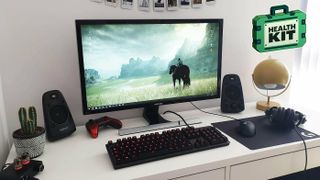
Before we get to the promised tips, a quick announcement: Over the next six months and beyond, PC Gamer will be publishing a series of articles on health and ergonomics. We're calling the project Health Kit, and AMD is supporting it. With input from doctors and other experts, we'll discuss ergonomics best practices, exercise, diet, repetitive strain injuries, eye health, and more. It's something we've wanted to do for a while now, and we're excited to make health and wellness a bigger part of PC Gamer's overall coverage.
As we talk to experts about PC gaming and health, we're spending a lot of time sitting at our desks. This first guide is a light introduction to Health Kit: nine simple ways PC Gamer team members have made their work and gaming desks a little healthier and more comfortable. The topic feels especially important now, as many of us are spending more time at home, and at our desks, than ever.
If you have suggestions of your own, consider sharing them in the comments below or in a discussion on the PC Gamer forums.
Get a giant mouse pad
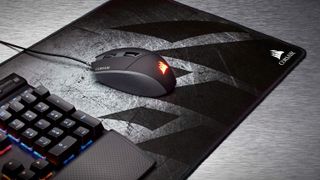
The standard mouse pad size was always too small. Get a big one, and when you're playing shooters, try moving your mouse hand from the shoulder and elbow rather than from the wrist. That's the same advice you'd get if you asked an art teacher how to draw a straight line—see if it helps you make straighter, smoother motions.
We recommend this huge Corsair mouse pad.
Consider a smaller keyboard

If you aren't an accountant or frequent user of Alt codes (Alt-0151 makes the long em dashes we use), ask yourself how often you actually use the numpad block of your keyboard. On a smaller desk, a tenkeyless board gives you more room for your mouse, so that you can move it freely without having to push your keyboard over so far that your WASD hand ends up awkwardly bent. In an ideal keyboard and mouse setup, both wrists are straight, which is hard to do with a full-size keyboard.
Mechanical keyboards are fashionable at the moment, so it's not hard to find all shapes and sizes of them. Our recommended ergonomic gaming keyboard is the Kinesis Freestyle Edge RGB, a compact, tenkeyless split keyboard.
The biggest gaming news, reviews and hardware deals
Keep up to date with the most important stories and the best deals, as picked by the PC Gamer team.
Hey, you can use two mice
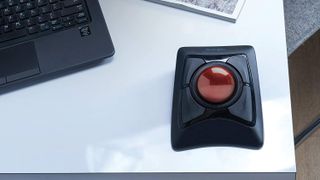
I don't know why it never occurred to me that I could own more than one mouse, but when PC Gamer global EIC Evan Lahti mentioned to me that he had two hooked up to his PC at once, I was taken aback. That's allowed?
Of course it is, and it might be a good idea if you work at your desk when you're not playing games at it. For example, you could use this Kensington trackball mouse for work, and then switch to your gaming mouse in the evening. That way, your arm, wrist, and hand aren't always in the same position, making the same movements.
Adjust your chair to the right height
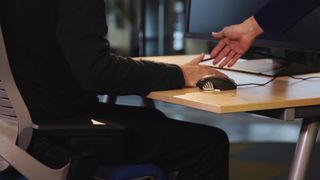
Your elbows should be about level with your desk so that your arms are bent at right angles when you're using your mouse and keyboard. Once you've adjusted your chair accordingly, you may have to make some other adjustments so that:
- Your knees are bent 90 degrees and your feet are flat on the ground. If this isn't possible due to the height of your desk, put a box or stool under your feet.
- You don't have to bend your neck up to see your monitor. The top of your display should be at around eye level, or slightly higher.
Read more desk ergonomics advice in this article, for which we consulted with a physical therapist.
If your chair isn't adjustable, or you just want a more comfortable one, we have a bunch of recommendations in our guide to the best gaming and desk chairs.
Stuff a pillow behind your back
Don't have a fancy chair with lumbar support? Me either. While built-in lumbar support is definitely what we recommend, you can approximate it by stuffing a small pillow between your lower back and the chair (or a small blanket, or a rolled up sweater). It can be hard to get the size and positioning just right, but unless it's pushing your torso too far forward (in which case, try a different pillow), it's better than nothing.
For a semi-permanent solution, cut a series of small, vertical slits across the top and bottom edges of the pillow case. Thread ribbons through them, and then tie the pillow to the chair back.
Take your wallet out of your back pocket

If you keep a wallet in your back pocket, take it out and put it on your desk before you sit down. By sitting on it, you're tilting your pelvis and possibly putting unnecessary stress on your back or pinching a nerve. "You could develop pain, patterns of alternately tight or weak muscles, and even altered breathing patterns" by constantly sitting on a lump, according to physical therapist Dr Caitlin McGee, who specializes in gaming-related health at 1HP Gaming.
After kicking the habit of sitting on my wallet, I felt a noticeable improvement in my comfort.
Get little desk fan with fabric blades
It will cool your sweaty hands and face on hot days, and you can stick your finger in between the fabric blades and enjoy the sensation of fan blades thwapping your finger, as we all do.
Chris Livingston's pick is the Vornado Zippi Small Personal Fan, which his cat also enjoys.
Get a plant
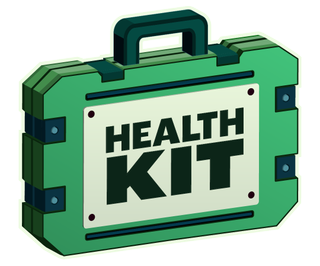
Health Kit is PC Gamer's coverage of health, ergonomics, and wellness, which is currently being produced with support from AMD. Throughout the rest of 2020, we'll be publishing more health-related articles and videos with advice from doctors and other specialists. Stay tuned!
You don't see a lot of PC gaming desks with plants on them, and that's too bad. Plants are nice, and a variety of studies show that being around them and caring for them can reduce stress—with the caveat that a fern will not turn an easily-tilted player into a guru of not-yelling-about-hitboxes-over-Discord. For example, a 2017 study on plants in the workplace concluded that they offer "some degree of stress reduction," but that further research is needed.
Even if plants aren't miracles, I think most will agree that they are pleasant things. They have nice colors, and sometimes they smell nice. Putting one on your desk, even a small one, suggests that you are thoughtful enough to keep something other than yourself alive, and you may find comfort in that—unless you kill the plant, in which case you can spin it into a lesson about the fragility of life.
Point is: If you have space, a plant placed on or near your desk is at best a stress reliever and at a worst a nice thing to have.
Get a good water bottle
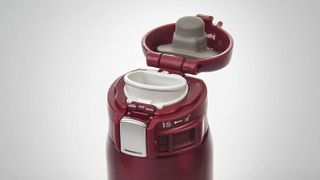
I always have something to drink at my desk. At my worst, it's a Red Bull or Diet Coke. At my best, it's water or tea. I feel significantly better (and sleep easier) when I shun the Bad Drinks and stick with the water and tea, but the Bad Drinks sing a siren-like song from gas station and grocery store fridges, and if I let my guard down the fizzy acid garbage ends up in my fridge and then in my mouth.
Buying a water bottle helped. I find that usually all I need is a sip of water to satisfy the urge that would otherwise cause me to head to the fridge and pop open a can of something. Yeah, I could just get a glass of water instead, but I find that having a sealed bottle next to me at all times is more effective at dousing cravings for aspartame.
If you want a really nice vacuum insulated bottle for hot drinks, too, check out Zojirushi's selection. Wes likes the Zojirushi 20 oz Stainless Steel Mug, which is $28 on Amazon. Otherwise, Chris is happy with his glass water bottle. I used a plastic one for a while, but it imparted a plasticy taste on my water so I ditched it.

Tyler grew up in Silicon Valley during the '80s and '90s, playing games like Zork and Arkanoid on early PCs. He was later captivated by Myst, SimCity, Civilization, Command & Conquer, all the shooters they call "boomer shooters" now, and PS1 classic Bushido Blade (that's right: he had Bleem!). Tyler joined PC Gamer in 2011, and today he's focused on the site's news coverage. His hobbies include amateur boxing and adding to his 1,200-plus hours in Rocket League.
Most Popular

